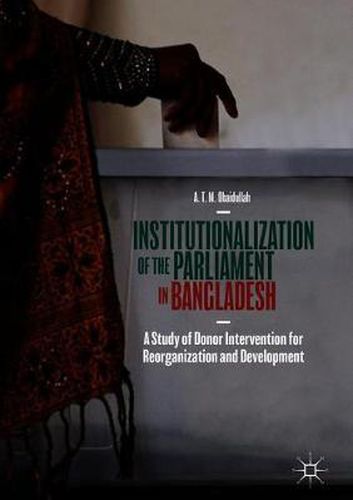Readings Newsletter
Become a Readings Member to make your shopping experience even easier.
Sign in or sign up for free!
You’re not far away from qualifying for FREE standard shipping within Australia
You’ve qualified for FREE standard shipping within Australia
The cart is loading…






This title is printed to order. This book may have been self-published. If so, we cannot guarantee the quality of the content. In the main most books will have gone through the editing process however some may not. We therefore suggest that you be aware of this before ordering this book. If in doubt check either the author or publisher’s details as we are unable to accept any returns unless they are faulty. Please contact us if you have any questions.
This book explores the institutionalization process with regard to the Parliament in Bangladesh, and seeks to identify the main constrains that hinder the Parliament from serving as the uppermost representative body for all segments of society.
This book sheds valuable new light on key reform initiatives carried out by donor communities in collaboration with the Bangladesh Parliament between the years 1991 and 2015 by presenting an extensive selection of donor proposals to make the Parliament a more potent political institution. The book also focused on the barriers of strengthening oversight, fiscal oversight in particular, resourcing parliament and its secretariat, hindering gender equality and gender responsiveness, counteracting forces that are weakening rule of law, civil liberty of the citizens, constitutionalism and democratic consolidation in the country.
The book presents a comparative picture of the pre- and post-reform Bangladesh Parliament, highlighting on the issue of how much the donor assistance can help promote institutionalization of the parliament and democratic consolidation of a developing country. The book will be of immense value to all scholars interested in democratic governance, administrative reforms, policy studies and the role of parliament as a watchdog ensuring accountability, transparency and national integrity.
$9.00 standard shipping within Australia
FREE standard shipping within Australia for orders over $100.00
Express & International shipping calculated at checkout
This title is printed to order. This book may have been self-published. If so, we cannot guarantee the quality of the content. In the main most books will have gone through the editing process however some may not. We therefore suggest that you be aware of this before ordering this book. If in doubt check either the author or publisher’s details as we are unable to accept any returns unless they are faulty. Please contact us if you have any questions.
This book explores the institutionalization process with regard to the Parliament in Bangladesh, and seeks to identify the main constrains that hinder the Parliament from serving as the uppermost representative body for all segments of society.
This book sheds valuable new light on key reform initiatives carried out by donor communities in collaboration with the Bangladesh Parliament between the years 1991 and 2015 by presenting an extensive selection of donor proposals to make the Parliament a more potent political institution. The book also focused on the barriers of strengthening oversight, fiscal oversight in particular, resourcing parliament and its secretariat, hindering gender equality and gender responsiveness, counteracting forces that are weakening rule of law, civil liberty of the citizens, constitutionalism and democratic consolidation in the country.
The book presents a comparative picture of the pre- and post-reform Bangladesh Parliament, highlighting on the issue of how much the donor assistance can help promote institutionalization of the parliament and democratic consolidation of a developing country. The book will be of immense value to all scholars interested in democratic governance, administrative reforms, policy studies and the role of parliament as a watchdog ensuring accountability, transparency and national integrity.